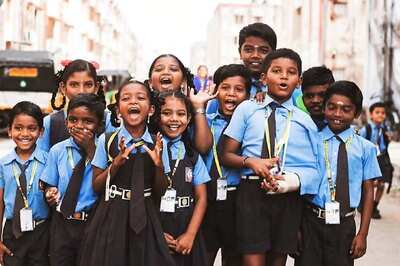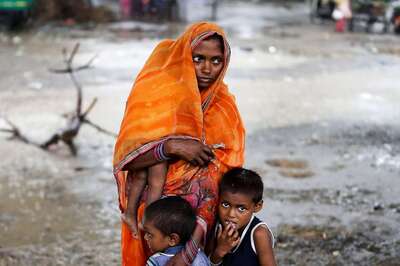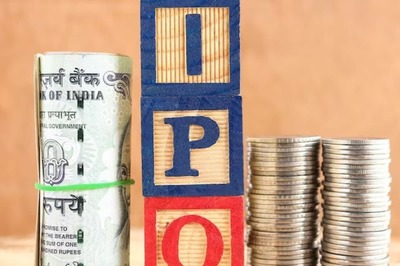
views
New Delhi: Planning Commission member Abhijit Sen that there was no downgrading of poverty benchmark during the period of 2009-2010 and it was the inflation that had brought about the change. He was responding to latest report by the Planning Commission, which said that the poverty in India has come down during the 2009-2010 period. The Commission said that more than 8 per cent of India has come above the poverty line in five years.
Here is the full transcript of Abhijit Sen's interview with CNN-IBN's Rupashree Nanda:
Rupashree Nanda: The new Planning Commission figures which have been released show the poverty line to be at Rs 22 and Rs 28 for rural and urban areas. If you go by this there is reduction in poverty. But is there a downgrading of the poverty line from the figure it has said in the Supreme Court?
Abhijit Sen: No. The figure given in the Supreme Court was carrying forward the poverty lines for 2004-05 to 2011. The 2004-05 poverty lines were rs 15 and Rs 19 for rural and urban areas. Carrying those forward to 2009-2010 gives you the figure of Rs 22 and Rs 28. If you carry it further to 2011 then it gives you the figure of Rs 26 and Rs 33. So there is no downgrading. It is just that 2011 comes after 2009 and there has been 15 per cent inflation between those two years.
Rupashree Nanda: Poorer states like Chhattisgarh, Bihar, Uttar Pradesh have shown a decline in poverty by just a percentage point with Odisha as the exception, whereas Karnataka, Maharashtra, Tamil Nadu have seen a greater decline. Does this mean that growth has not been equal? Why have poorer states shown a very marginal decline in poverty?
Abhijit Sen: Well, if there is a pattern at all, the pattern is the following - States across the country have reduced poverty quite significantly with the exception of Bihar and UP and the Northeast. Odisha, for example, was the poorer state that has done rather well. Infact, it has done the best. There are a number of reasons. It could be as you said, growth has been uneven but it is also a fact that during this period the anti-poverty schemes which have worked out like MNREGA by the Centre and considerable changes in the PDS in some of the states actually bypassed the Northeast and UP and Bihar. UP and Bihar have lagged in MNREGA while Odisha has done much better. Odisha has major PDS reforms. Nothing of the sort happened in Bihar and Uttar Pradesh. It partly is a growth story, and it partly must do with the anti-poverty programmes having worked across states.
Rupashree Nanda: Would you say that MNREGA is one of the biggest contributing factors in reducing poverty in rural areas?
Abhijit Sen: I think it is a substantial contributing factor. How much contribution as a proportion of the total reduction, I have not worked it out. But the contribution of other factors must have been also substantial. Just employment growth, not due to MNREGA but just due to growth, the differential price movements over different states has partly to do with the way their PDS works. Other features like some states have targeted their programmes better than other states. Having said that let me also draw a caveat. The Tendulkar figures and the Tendulkar method like any other statistical method has possible errors and these errors are going to be larger in relatively smaller states. Therefore, I would look at the Northeast figures with certain amount of doubt because the probability of being wrong with a small sample size is high and this is far more so for the Tendulkar method also where price data also comes from samples. There is another reason why some of this data might be looked at differently by different statisticians and that has to do with the fact that generally it appears that poverty has fallen more where the urban population is higher although the rate of poverty decline is much higher in rural areas than in urban areas.
Rupashree Nanda: The traditional groups which are poor like Muslims, agriculture labour continue to be poor.
Abhijit Sen: The press release is confusing in this matter. What it does show is that among the various religious groups, the Muslims are the poorest. Of course, the Muslims are not as poor as the Scheduled Tribes or Scheduled Castes. It is also the case that the relative ranking across castes or religion has not really changed. Those who used to be poorest are still the poorest. But it is also the case that poverty has declined for all of them.
Rupashree Nanda: There is a worry that these new figures with reduction in poverty percentages might affect entitlement in the Food Security Bill. After all, why would they go by old estimates? They would go by new estimates, the most recent estimate?
Abhijit Sen: As far as the impact of any such poverty number on who gets or how many people get benefits from government schemes is concerned, it varies from scheme to scheme. By and large, of the central government, most schemes are not linked to the poverty line. MNREGA is not linked to the poverty line and most schemes of rural development are not. The only ones which are are certain pension schemes and the PDS. As far as the PDS is concerned, nothing will happen till Parliament passes the Food Security Bill, the act which is in front of Parliament today and the Standing Committee does not link it to poverty. It links it to certain numbers but does not link it to poverty. The Standing committee might want to change those figures but these are matters which the Standing Committee has to decide.
Rupashree Nanda: Sir, the numbers are taken from the estimates of poverty by the Planning Commission. They did not get the numbers from nowhere?
Abhijit Sen: That is right except that if you remember there was a joint declaration between the deputy chairman of the Planning Commission and the Ministry of Rural Development. Following that certain changes were made to the wording of the Act so that reference to poverty and poverty caps of any kind were removed from the draft bill in front of Parliament. That is the property of Parliament. Parliament might bring it back. Parliament might not have it. We have to wait and watch.
Rupashree Nanda: But you would concede that these figures would affect entitlement in the Food Security law?
Abhijit Sen: My own feeling and a personal guess in this matter is that it will not.



















Comments
0 comment